About us
Shaping the Future:
The Eco-School Methodology
The Eco-Schools programme combines education and sustainability with empowering children to care for the planet while fostering a love for learning.
The Eco-Schools methodology aims to include environmental education in everyday classes so young people and educators can make the best decisions to protect our planet within their setting.
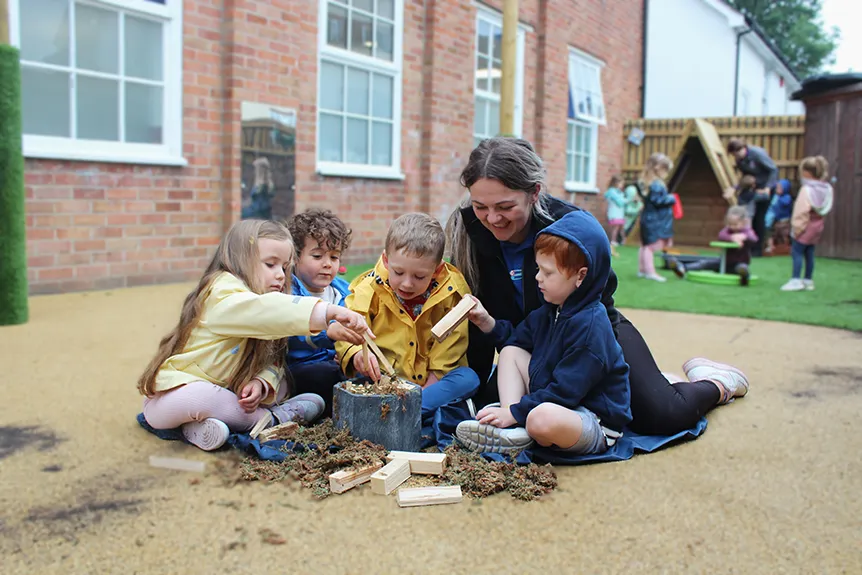
What is the Eco-School Approach?
The Eco-Schools programme is an internationally recognised accreditation that engages schools, nurseries, colleges and other educational settings to include environmental, sustainable and biodiverse teachings within their setting.
In 1994, the programme launched in Denmark, Germany, Greece and the UK with the support of the European Commission. It is now a global organisation with Eco-Schools in every country around the world, empowering young people to take environmental action within their local community.
The Eco-Schools programme follows a seven step framework which helps young people become environmentally aware, critical thinkers, and develop a sense of responsibility.
Any educational provider can apply to be an Eco-Schools accredited nursery. All they need to do is complete and submit their Eco-Schools application during the academic year, between the 1st May and 31st July, and if successful, they will receive an Eco-Schools Green Flag Award.
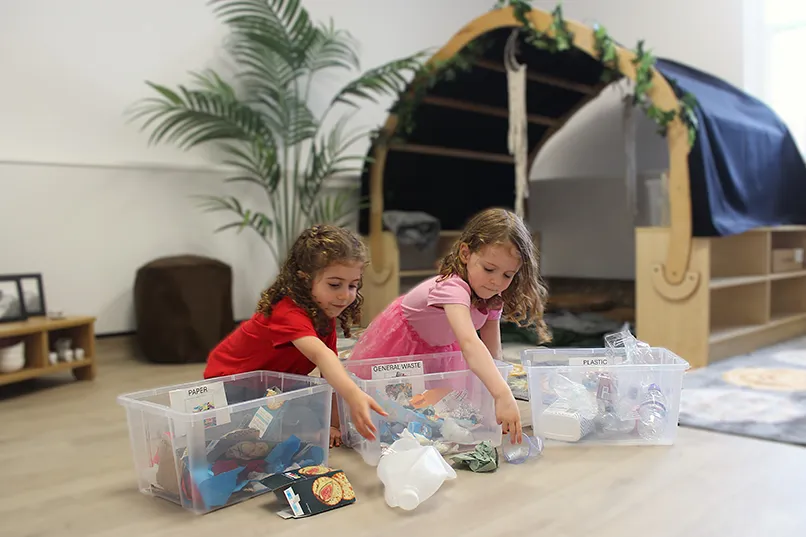
Key Principles of the Eco-School Approach:
The Eco-Schools and the Foundation for Environmental Education (FEE) put together eight educational principles for all educational providers to follow. These principles cover the following elements:
Environmental Stewardship
To teach young people how to care for our planet and take action on climate change, educators incorporate lessons on subjects such as reducing waste, recycling and growing plants that attract wildlife into their everyday classes.
These lessons will give the next generation the knowledge to make informed decisions across all aspects of life to reduce harm to our planet.
Our Kiddi Caru Day Nursery & Preschool in Wellingborough includes lessons on water conservation within their nursery to teach children where our water comes from and how important it is to not waste water.
This includes fun and engaging activities where the children collect water to use within their nursery garden.
Active Participation
The Eco-Schools Green Flag Award requires a demonstration of hands-on involvement in eco-friendly projects.
This could be anything from registering with Count Your Carbon, a free full scope emissions calculator for schools, nurseries, colleges and other educational providers to use, to working with the wider community to advocate for taking care of local green spaces.
These types of activities empower young people to take tangible action, facing social and ecological challenges with confidence.
Our Kiddi Caru Day Nursery & Preschool in Colchester conducted a litter picking activity within their local green spaces to not only improve the local environment but also encourage children and staff to work together in keeping their community grounds clean and green.
Sustainable Habits
The Eco-Schools programme encourages education providers to embed eco-conscious habits all year round within their setting.
This can cover a broad range of topics such as conserving energy, recycling, or supporting eco-friendly initiatives.
The organisation also provides Eco-Schools Early Years settings with a free Eco-Schools training course to help nursery practitioners incorporate environmental education within their daily routines with ease.
The Eco-Committee at our Kiddi Caru Day Nursery & Preschool in Matford Green, Exeter began incorporating environmental education within their setting by first identifying the areas in their Environmental Review where they scored low and then planning lessons and activities around these areas.
Holistic Education
By combining environmental awareness with traditional learning, Eco-Schools settings create a holistic learning environment that engages all aspects of cognitive, physical and emotional development.
Settings that are Eco-Schools work to highlight all areas where children can take eco-friendly action.
This could be conserving energy by switching off lights, making their grounds more environmentally friendly, travelling to and from school by cycling or walking, and so much more!
Our Head Start Day Nursery & Preschool in Milton Keynes chose three environmental areas to focus on, litter, biodiversity and waste, and incorporated these into their daily activities at nursery.
This created a well rounded approach to environmental education that included action based learning and the fundamentals of the the Early Years Foundation Stage (EYFS) framework.
How the Eco-School Nurseries Inspire Learning
The Curiosity Approach sparks awe and wonder in early childhood education in many ways:
Sustainability Projects
By nurseries and preschools taking part in sustainable development projects, they help Early Years children take their first steps to take action on climate change.
Nursery activities such as recycling, composting, and energy-saving initiatives teach children practical ways to protect the environment that they can use later on in life.
As a part of the Eco-School initiative, nurseries and preschools can register with charities which help them take action on environmental issues.
Organisations like Cut Your Carbon, 2024 are great for educational providers that are new to the Eco-Schools methodology as they provide resources, like a free full scope emissions calculator, and ideas on how to start taking environmental action, such as how to reduce energy usage in an educational setting.
Gardening and Biodiversity
Using the nursery and preschool garden or outdoor space is a great place to attract wildlife and increase biodiversity.
Projects that include planting a flower garden, creating a vegetable patch, and making bird feeders teach young people how to best take care of nature so it can thrive for years to come.
By children understanding the lifecycle of nature, such as planting potatoes, making sure they have good compost, water and sunlight, then harvesting these potatoes, peeling and chopping them to include in their nursery meals and then putting the peels in the compost bin, shows children how they can work with nature to sustain a healthy eating practice and grow their food locally, which all supports a thriving biodiverse plant.
Outdoor Exploration
Getting outside is not only good for the mind, body and soul, but also teaches children about nature and facilitates a strong bond with the world around them.
Activities such as nature walks, pond dipping, bug hunts and other outdoor exercises, help children develop a strong understanding of the natural environment.
By nursery practitioners facilitating a bug hunt, children can slowly learn what insects call their garden ‘home’ and develop an understanding of how they contribute to nature’s cycle.
This can spark curiosity about our ecosystem in every child, helping develop a longing to protect our planet.
Eco-Themed Learning Activities
Nursery practitioners use activities centred around eco-friendly action to help children understand the benefits of reusing items.
Repurposing recycled materials such as bottle caps, toilet roll inserts, or plastic bags for arts and crafts, allows children to use their imagination and creativity to produce something new and something to be proud of.
Creative activities centred around sustainability are a fun and engaging way to facilitate learning about eco-friendly subjects such as recycling, waste and how it can affect our planet’s climate change.
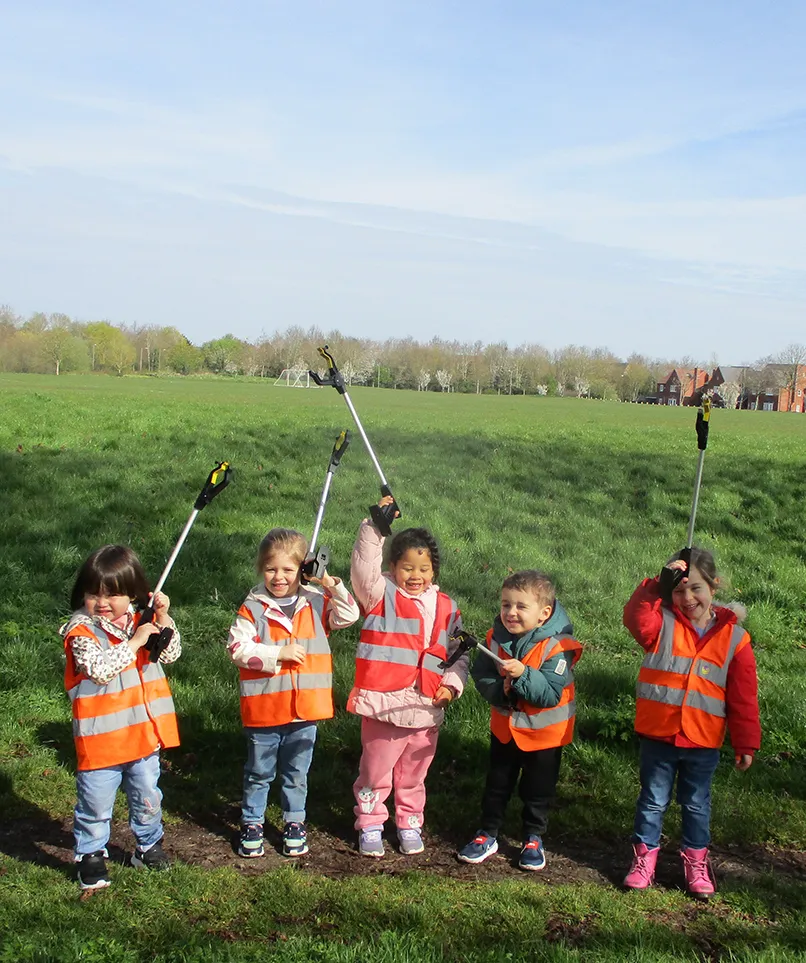
A Day in an Eco-School Nursery
A typical day in an Eco-School Green Flag award-winning nursery can vary from day to day to keep children engaged and having fun at all times.
That’s why it’s always valuable to visit your desired Eco-School nursery and preschool to get an idea of how they tackle environmental issues within their setting.
Here’s a rough guide to what you can expect from a typical Eco-School focused day at nursery:
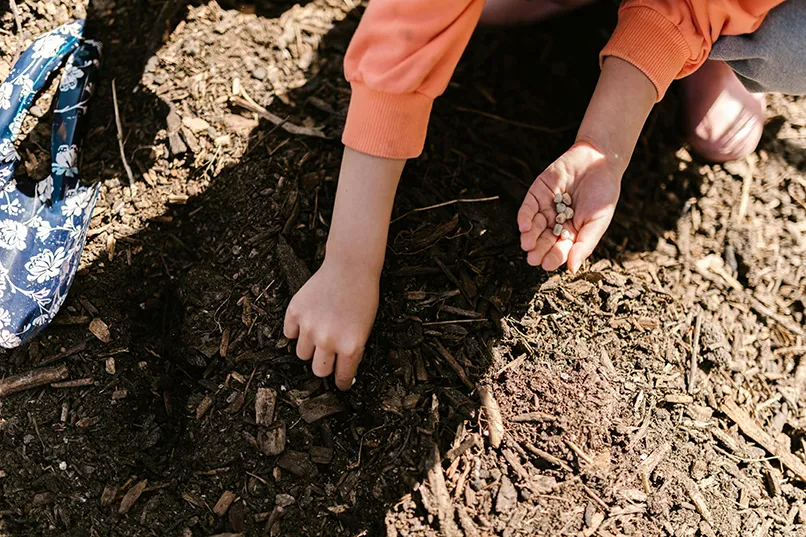
Why Choose an Eco-School Nursery?
Like many of the other Early Years education methodologies, there are many benefits to an Eco-Schools accredited nursery. Here are just a few we like to highlight:
1. Instils Lifelong Eco-Friendly Habits
Up until the age of eight, children’s brains learn at a rapid pace. Therefore, Early Years Eco-Schools practices can generate environmentally friendly habits that will become second nature during a child’s life.
Hands-on activities like recycling, gardening and nature walks, not only help children understand how to look after our planet but shape their mindset helping them make informed decisions later on in life.
According to the Eco-Schools organisation, over 98% of educators felt that the Eco-Schools programme helped increase environmental awareness amongst young people in their setting.
2. Promotes Critical Thinking and Problem Solving
Nurseries and preschools completing the Eco-Schools Environmental Review, encourage children to think critically about what they do now, if this can be improved and how to make better decisions or actions moving forward; a skill that will help them become better learners for life!
The Action Plan helps young people and educators create and plan activities to help them tackle their goals moving forward, developing the foundations of problem solving skills and creativity in every child.
Approximately 1.15m m2 of natural habitats were created or maintained last year, according to the Eco-School organisation, supporting biodiversity in these settings with meadows, wildflowers, and rewilding areas.
3. Develop a Strong Connection to Nature and Environmental Responsibility
Eco-School nurseries and preschools immerse children in the natural world! Through nature walks, bug hunts and other forms of outdoor play, children develop a strong connection with their environment and grow empathy for wildlife and all living creatures.
By developing this connection, children gain the confidence and motivation to take action on climate change and other environmental issues, making our world a better place.
According to the Eco-Schools report, over 96% of educators agreed that the Eco-Schools programme increased their children’s confidence while taking part in this initiative.
4. Combines Academic Learning with Real-World Sustainability Practices
This methodology is a great balance between environmental education and vital Early Years development.
Hands-on activities like measuring rainfall, learning about solar energy and taking part in the Cut Your Carbon 2024 campaign all use the basics of STEM theory, helping children prepare their understanding of science and maths in preparation for school.
By working together, the Eco-Schools Impact Report 2023-2024 shows that collectively young people and educational providers saved an extra 4.6m kWh in gas usage this year when compared to the previous academic year.
To read more about the Eco-Schools programme benefits and statistics, check out their impact report 2023-2024 on the Eco-Schools website.
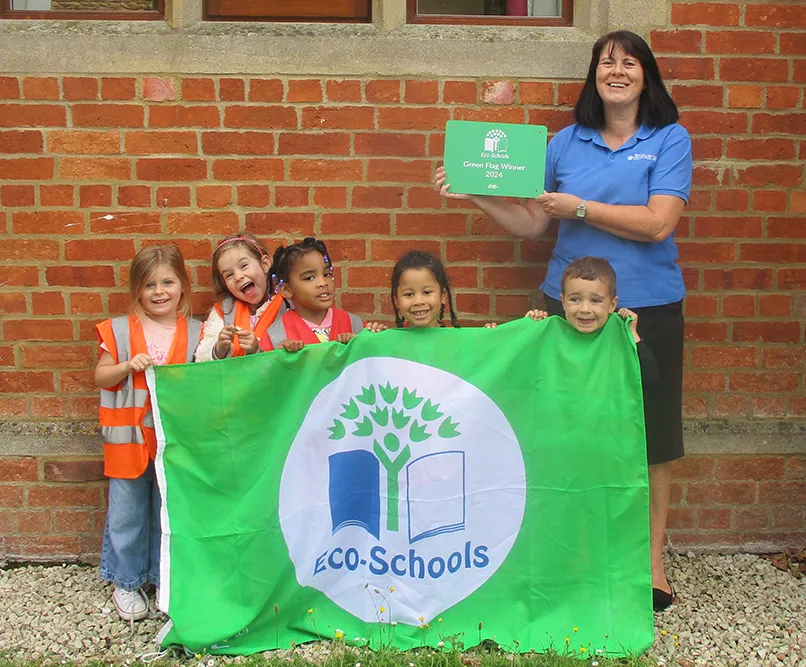
Ready to Join the Eco-School Movement?
Many of our nurseries and preschools across our Grandir UK network have gained the Eco-Schools Green Flag Award.
Visit your chosen nursery today and talk to the Nursery Manager and Eco-Schools teacher about their Eco School accreditation and daily activities today!